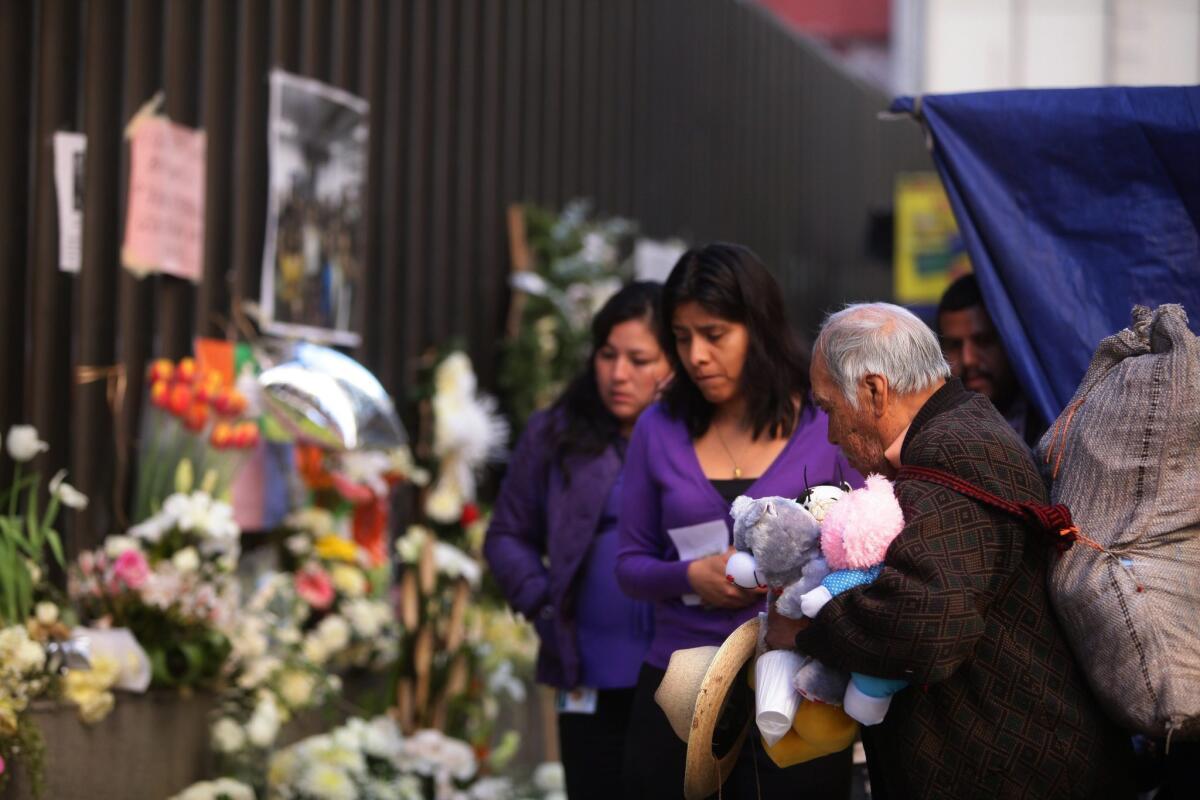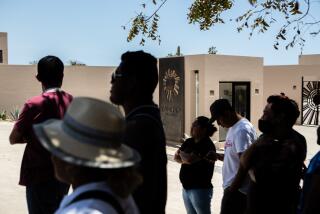Workers return to Mexico’s Pemex HQ after blast that killed 37

- Share via
MEXICO CITY -- Workers at Mexico’s state-run oil company have begun returning to the job -- some apprehensively -- amid official declarations of back-to-normal conditions at the headquarters that suffered a deadly work-hours blast last week.
Some workers expressed concern and doubt over the government’s initial explanation that the blast was caused by an accumulation of gas ignited possibly by an electrical spark, while others declined to discuss the topic or said evidence pointing to an accidental gas explosion seemed strong.
The workers were interviewed Wednesday, the first full day of operations at the Mexico City headquarters of Petroleros Mexicanos, or Pemex, since the explosion Jan. 31 that killed 37 people and injured more than 120.
Briefly in the early afternoon, some sections of the Pemex complex had been evacuated after reports of a gas-like odor in one of the buildings. The alarm turned out to be false, linked to moldy food, said Emilio Lozoya, Pemex’s general director.
Nonetheless, the jitters were visible on the faces of workers who were filtering out of the complex after the 4 p.m. finish to the day’s shift.
People in khaki-colored uniforms or office clothing crossed themselves while passing a makeshift memorial to the victims in the shadow of the main executive skyscraper. Signs posted near entrances offered employees psychological services to help cope with any trauma since the blast.
Maria Gallardo, a secretary who has worked for Pemex for 25 years, stood at the memorial and gestured to faces she recognized in a printed photo of the human-resources department that was in the basement.
The government’s explanation of what happened has been met with some skepticism.
Pemex has a history of shoddy maintenance, rampant corruption and lax security. Speculation about the cause of the blast has ranged from tragic industrial accident to deliberate sabotage aimed at destroying sensitive documents or derailing efforts of the new government to open the long-protected state monopoly to private and foreign investment.
Luis Alvarez, a 26-year-old plant worker who’s been on the job for less than a year, said he participated in rescue efforts in the blast zone. He said he didn’t have a reason to believe the explosion was not caused by an accumulation of gas.
“They’re saying so many things, you don’t even know what to think,” Alvarez said. “I wasn’t there when it hit. Some said it did smell weird. According to what my coworkers said, those who were there, you could think that what [the government said] is the truth.”
Adriana Gutierrez, an office worker of 29 years, stood near a photo she placed in memory of a victim and friend, secretary Laura Gonzalez Sanchez, who worked in a top floor in the main skyscraper and died as she walked past the administrative building when the blast hit.
Gutierrez said the blast might have been intended to destroy records. She said was unafraid to return to work.
The office-worker said she found it “strange” that President Enrique Peña Nieto visited the blast zone hours after the explosion hit, when it was still unclear what had caused the blast or whether any kind of threat persisted.
“It hadn’t been clarified what had happened, so why did the president of the republic come? When you look at everything, you say, ‘Yes, it’s political.’ The dumbest person would see it,” Gutierrez said.
Authorities have said none of the dead were dismembered or had severe eardrum damage -- typical results of a bomb. The only victims with burns were three workers whose bodies were found in the basement where the explosion occurred, they said.
That is leading investigators to theorize that the workers may have ignited an unseen and apparently odorless gas, possibly with faulty wiring in a lightbulb they connected to illuminate a concrete chamber below the basement.
ALSO:
Mexico official says deadly Pemex blast caused by gas
Six Spanish tourists raped by gunmen in Mexico, authorities say
Iran’s Khamenei rejects direct talks with U.S. on nuclear program
More to Read
Sign up for Essential California
The most important California stories and recommendations in your inbox every morning.
You may occasionally receive promotional content from the Los Angeles Times.










